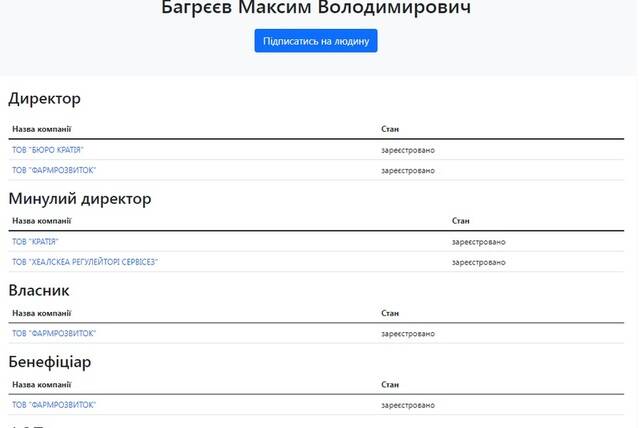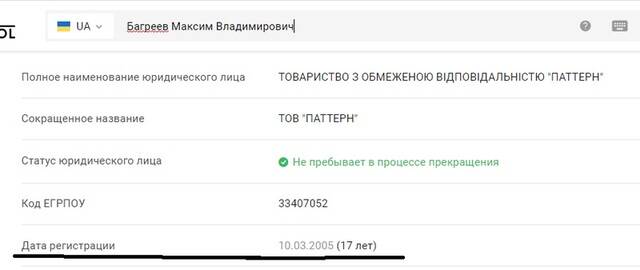The shadow schemes of "Cratia": pharma-mafioso Maksym Bahryeyev’s fuflomycins continue to poison consumers

The shadow schemes of "Cratia": pharma-mafioso Maksym Bahryeyev’s fuflomycins continue to poison consumers
While the war has diverted public attention, it seems that many have forgotten that the shady schemes that various crafty individuals used to profit from have not disappeared. In fact, these schemes continue to generate just as much money for their organizers as they did before the war.
In some instances, these illicit money flows—stolen from the state and the people—have only increased. A prime example of this is the pharmaceutical market. To better understand what is being discussed, it’s necessary to give a brief overview. Imported pharmaceuticals brought into Ukraine must go through a certification process to ensure they comply with the country’s regulations. In simple terms, a certificate is required to confirm that a tablet or vial of medicine is truly what it claims to be, and not a counterfeit.
It’s clear that such an expert conclusion must be given by someone. And it is precisely in this field of drug certification that some very clever citizens saw an opportunity to earn big money for themselves. One of them is Maksym Bahryeyev, who registered a number of companies that issue certificates for imported medicinal products into Ukraine:

The shadow schemes of "Cratia": pharma-mafioso Maksym Bahryeyev’s fuflomycins continue to poison consumers
Maksym directly or through proxy persons owns LLC "Cratia" and several companies affiliated with this LLC: "Cratia Legal", "Cratia Illegal", "Bureau Cratia", LLC "Cratia", LLC "Professional Regulatory Services", LLC "Health Care", LLC "Kalyna Medical Production Company", LLC "Kalyna Business Development Company", LLC "Uni-cert", and LLC "Improve Medical". A small around-pharmaceutical empire.
What do all these "Cratias" earn from? The answer is simple – so-called "consulting services". In this case, these are in quotes for a simple reason – all these companies are essentially mere intermediaries that cover simple exactions from drug importers and the distribution of bribes to high-ranking officials in the healthcare industry.
The essence of the scheme is simple, and it is best demonstrated using the example of COVID-19 rapid tests that were purchased from China at the very beginning of the coronavirus epidemic. Tests from the Chinese manufacturer Bioeasy were purchased centrally and advertised as "certified in Ukraine". Specifically, this was stated by the mayor Vitaliy Klychko when talking about the measures being taken by the city authorities to combat the epidemic.
Klychko didn’t lie – the tests were indeed certified in Ukraine by Maksym Bahryeyev’s structures. But the matter is that somehow no one paid attention to the fact that these very same tests were sent back by Spain to the manufacturer. There were two reasons: they turned out to be inaccurate, but most importantly, the Chinese authorities officially stated that the manufacturer did not have a license for their production. The Chinese embassy in Spain issued an additional statement saying, "the company Bioeasy is not among the list of classified suppliers of such products and does not have a license to produce these tests."
However, this did not prevent Ukraine from certifying these tests and selling them to its citizens as official medical products. How was this achieved? To understand the processes, one has to delve a little into history. Until 2013, permits for the supply of medicinal products to Ukraine were issued by the State Enterprise "State Pharmacological Center" (now it is called "State Expert Center of the Ministry of Health of Ukraine"). It was this enterprise that conducted the necessary examinations and research and decided whether what they wanted to bring into our country could be considered medicine or not.
Maksym Bahryeyev began his activities in supplying medical products, if supplements can be considered such, which he specialized in, approximately in 2005. It was then that he set up a system of bribes at the State Pharmacological Center. Initially, Maksym acted as a mediator between suppliers and the management of the State Pharmacological Center. "Resolved issues". However, this phenomenon was not yet systemic – there was no clear pricing and no clear recipients. Issues were solved on the go, which greatly complicated the activities of both Bahryeyev himself and the people who contacted him.
This activity began to grow into a well-established system with the change of leadership in the State Pharmacological Center – the aging academician Stefanov was replaced by the energetic Viktor Chumak, who brought with him the no less energetic deputy Olha Buala. They rebuilt the scheme of "work", deciding that it was much more efficient and safer to work with legal intermediaries. These became "consulting companies in the field of pharmacology". Maksym Bahryeyev immediately registered LLC "Pattern":

The shadow schemes of "Cratia": pharma-mafioso Maksym Bahryeyev’s fuflomycins continue to poison consumers
This company began to provide these "services". Moreover, it is known that the company was shielded from the interest of the relevant authorities by SSU employee Serhiy Nazarenko. But this was just the beginning of the rise of Bahryeyev and the company – at this stage, he was merely the same mediator between large players in the pharmaceutical market and the Ministry of Health of Ukraine.
However, such activities allowed a detailed study of the mechanism of interaction between the state and the pharmaceutical industry. Which Bahryeyev quickly took advantage of – "consulting firms", in which he was the beneficiary, began to multiply like mushrooms after rain.
The catalyst for the blossoming of Bahryeyev’s activity was changes in the rules of the pharmaceutical market – in 2013, Ukraine took a course to change the rules of technical access for medical devices to the consumer market according to the European model. At that time, government decrees were adopted on the gradual transition to assessing medical device conformity to technical regulations. It was determined that from the summer of 2017, medical products could only be supplied after certain companies assessed and certified their compliance with technical regulations.
The change of power in 2014 and the ensuing chaos in the country’s management system allowed one of Bahryeyev’s firms, LLC "Uni-cert" - to gain permission to become such a conformity assessment body for medical devices. This meant issuing permits for importing medical products into our country. In fact, it replaced the state body that previously handled these permits.
The state handed over these functions to thirteen private firms, among which, besides LLC "Uni-cert", there were several different "Cratias". One can only guess what profits this activity brought to Bahryeyev. Specialists noted a sharp influx of previously unknown Indian companies producing medical products on the Ukrainian pharmaceutical market. In what conditions these "products" were manufactured, one can only guess, especially after finding on the map the locations of productions, which were situated in remote Indian villages. Judging their effectiveness is already out of the question.
But the fact remains – such a sharp rise in Indian products was noted. As well as the shortest timeframes in which permits for the import of these products were issued. To understand that this process cannot be swift, recall – it’s about medicines, and for the permission to sell them, clinical research needs to be conducted. Whether there is even a single clinic in all these Bahryeyev "Cratias" is a rhetorical question, of course.
How and why did all this happen in the field of drug certification? The law stipulates that access to the Ukrainian market can occur through the full procedure with an audit of the producer, or through the recognition of an EU certificate. The first path is complicated and lengthy, involving sending a representative of the certification body to the production site, inspecting, evaluating documents, and approval, among others.
The second path is the so-called "partial recognition procedure", which allows avoiding audits and reducing the certification costs of products allowed in the EU. Certification occurs based on an existing European document, from those with whom Ukraine has mutual recognition agreements. The document turns out to be not entirely clean, or entirely not clean, but the Ukrainian certification body looks at it through fingers, and good consultants also ensure all formal requirements of local legislation, for instance, "Cratia" provides its representative to the European or pseudo-European supplier, as was in the history with Indian drugs.
In 2016, the state began to regain consciousness and tried to bring some order into this field and started to check the companies that became conformity assessment bodies for medical devices in 2014.
The result was several criminal cases, in one of which - № 12017000000001548 – LLC "Cratia" and LLC "Uni-cert" were involved. It was opened on the facts of supplying medical devices to state tenders with forged certificates of conformity.
Unfortunately, due to the war, state judicial registers are closed, but from earlier publications, it is known that "in the course of pre-trial investigation, it was established that officials of the authorized certification bodies (we are talking about ’Uni-Cert’) during work on assessing the conformity of imported medical devices, equipment, and production sites, violations of Technical Regulations requirements, approved by Cabinet of Ministers of Ukraine decisions No. №753, 754, 755 from 02.10.2013 were committed, as well as the sale of medical devices through budgetary funds, not confirmed by safety and effectiveness indicators and without warranty service... During the investigation, it was established that ’Cratia Ltd.’ was a counterpart with the medical devices certification body and performs certification and issues certificates of conformity on medical devices possibly violating Technical Regulations requirements..."
Searches were conducted in the offices of LLC "Cratia" and LLC "Uni-cert" and documents were seized. But the case was stalled. And Bahryeyev was assisted in this by the then Deputy Minister of Economy Taras Kachka. And Bahryeyev quietly transferred the main activity from LLC "Uni-cert" and LLC "Cratia" to the mirror company LLC "Uni-cert Medical", which was in no way involved in the criminal case:

The shadow schemes of "Cratia": pharma-mafioso Maksym Bahryeyev’s fuflomycins continue to poison consumers
Although the registers are closed, it should be noted that the criminal case, in which the violations of LLC "Cratia" and LLC "Uni-cert" were investigated, never concluded. In the press, it was noted that in addition to Taras Kachka, Bahryeyev found other protectors. Among them, the names of Giorgi Beradze, who once held the position of acting head of the State Office for Institution Affairs and during Viktor Yanukovych’s presidency worked as deputy head of the State Office for Institution Affairs Andriy Kravets, were mentioned.
Another name also sends us back to Yanukovych’s times. It’s the famous Croatian businessman Zhelko Hranatir, the same one who in 2009 supplied 27 reanimobiles for the Ministry of Emergency Situations at a price three times higher than the market price. Moreover, these vehicles turned out to be unfit for operation, as they did not meet the requirements of the Ministry of Emergency Situations and the Ministry of Health.
Hranatir is a partner of businessman Kostyantyn Hayevskyi, known for being the sole supplier of medical equipment from Toshiba Medical (MRI/CT – machines, ultrasound, X-rays, among others) to Ukraine for over 10 years. The sale of medical equipment was carried out through tender procedures at clearly overpriced rates. However, instead of new Toshiba machines, Hayevsky’s firms delivered outdated, already-used, and often unfit for operation parts to Ukrainian hospitals.
As is evident from this short story, in terms of the activities of various scammers in our country, nothing has changed for many years. Maksym Bahryeyev began his near-pharmacological activities during Yushchenko’s time. Since then, Yanukovych and Poroshenko have come and gone. His matters improved during their qridrqidrtiqhkkmp times.
But Maksym has especially "risen" under Zelenskyy. It’s hard to blame the latter or maybe Bahryeyev was simply "lucky" with the coronavirus. But if Maksym Bahryeyev continues to be "lucky" with supplying medicine for a country literally bleeding, it will pose threats not only to him but to those who cover him in the current government. And they will be dealt with not in the courts, this can be predicted fairly accurately.
Распечатать

